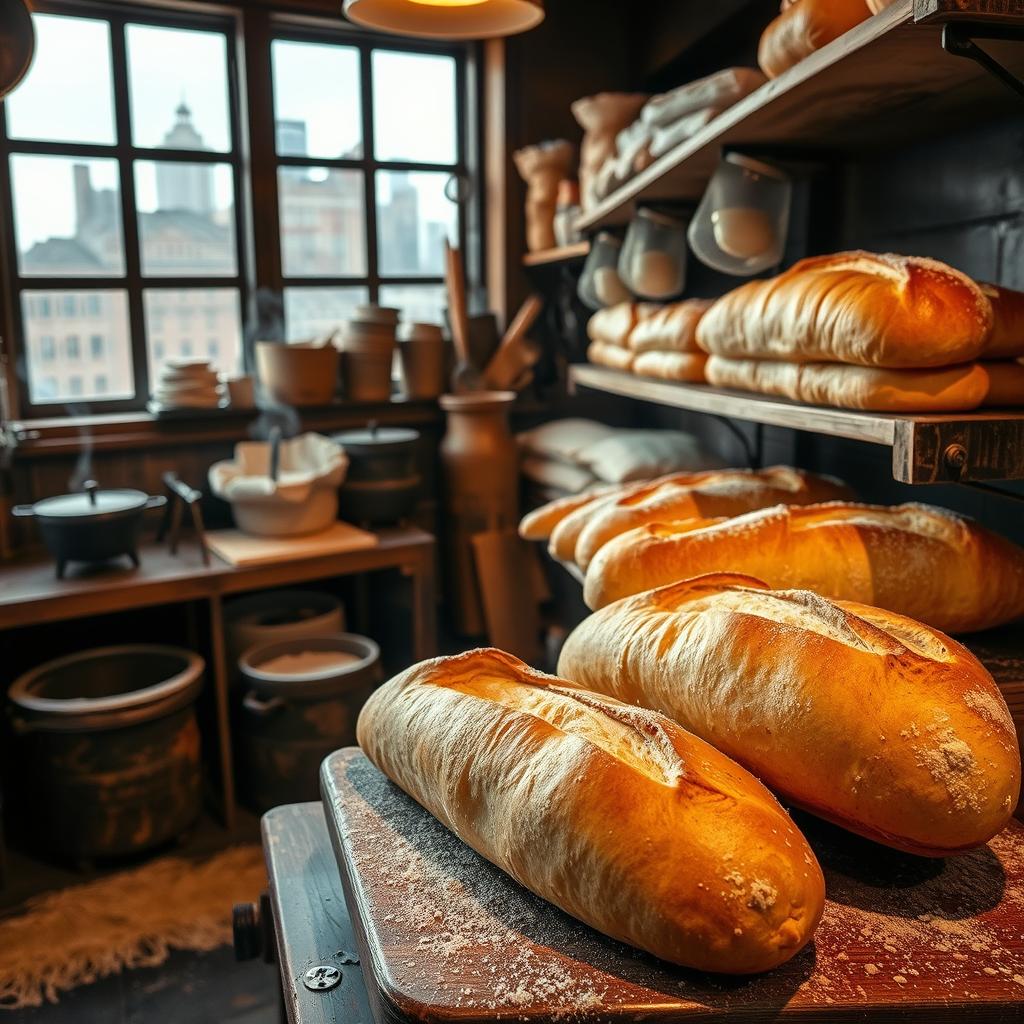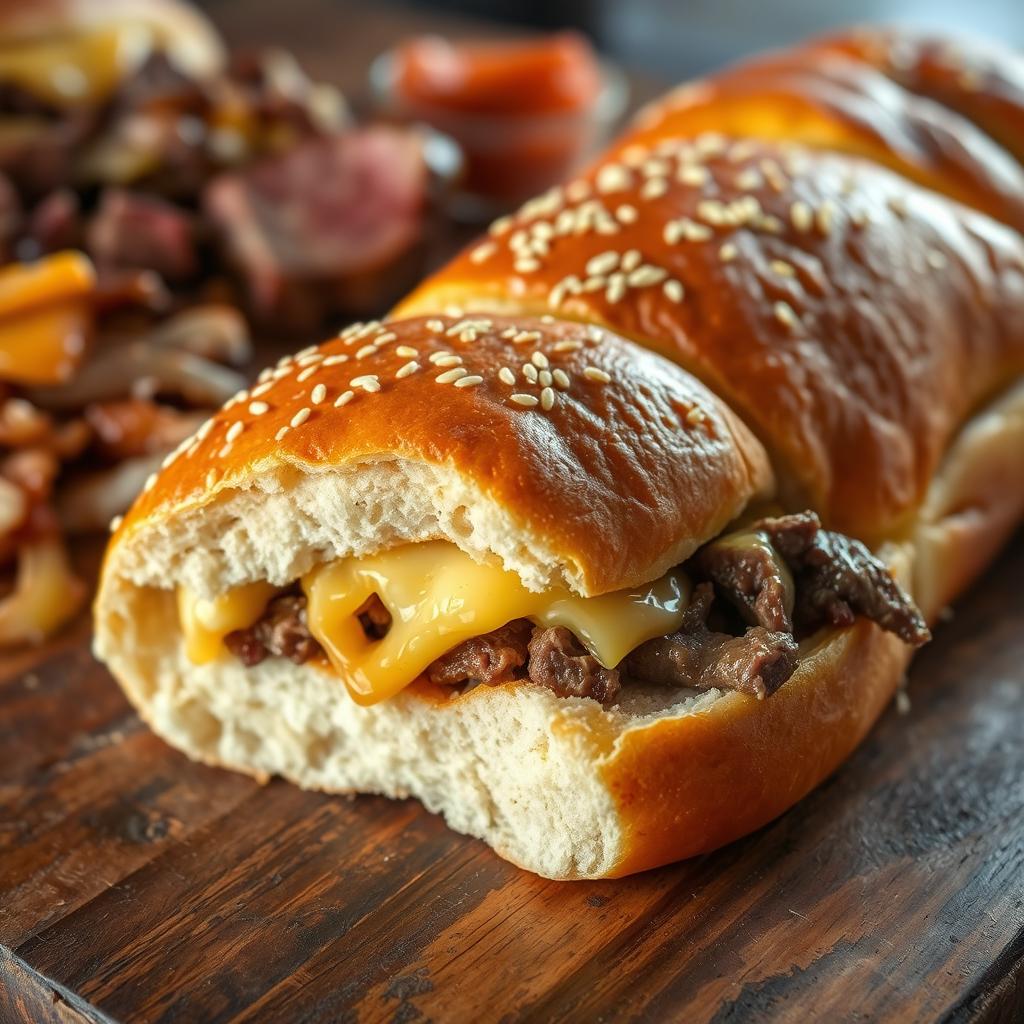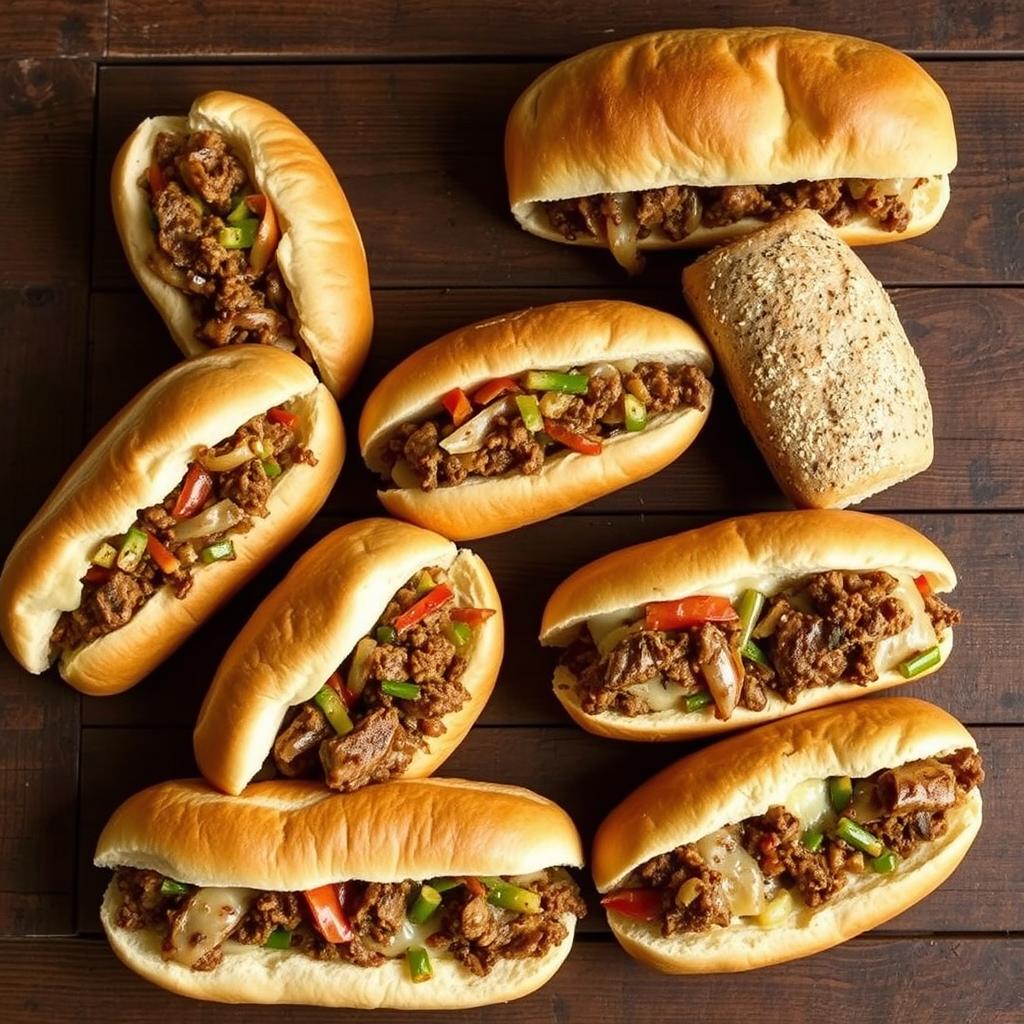Making the perfect philly cheesesteak bread is an art. It’s deeply rooted in Philadelphia’s food culture. Your search for a real cheesesteak starts with the bread’s role in taste.
Every great cheesesteak needs amazing bread. It must hold up to rich fillings. The right stuffed cheesy bread turns a simple sandwich into a legendary dish.
Whether you cook at home or love sandwiches, learning about philly cheesesteak bread will boost your skills. It will also delight your taste buds with true flavors.
Key Takeaways
- Bread quality defines an authentic cheesesteak experience
- Philadelphia-style sandwiches require specialized bread techniques
- Understanding bread composition is crucial for perfect texture
- Homemade rolls can significantly enhance sandwich quality
- Regional bread traditions impact sandwich authenticity
Understanding the Authentic Philadelphia Bread Tradition
Philadelphia’s bread-making heritage is deep and rich. It has shaped the city’s famous cheesesteak. The bread used is key to the sandwich’s identity.

Philly rolls have a long history. Skilled bakers in neighborhood bakeries perfected their craft over generations. They turned simple ingredients into amazing rolls for cheesesteaks.
History of the Original Philly Roll
Philly cheesesteak buns, or hoagie rolls, come from Italian immigrant bakers. They have a crisp outside and a soft inside. This makes them perfect for meat and cheese.
- Originated in working-class neighborhoods
- Developed by Italian-American bakers
- Designed for hearty, portable meals
Traditional Bakery Techniques
Local bakers use special methods to make these rolls. They pick the right flour, control the water, and slow-proof. This creates deep flavor and the right texture.
“A great cheesesteak starts with an exceptional roll” – Philadelphia Baking Tradition
What Makes Philadelphia Bread Special
Philadelphia bread is special because of its ingredients and techniques. The rolls can hold juicy meats and melted cheese. This is what makes a cheesesteak authentic.
Knowing about these traditions shows why Philadelphia is the top place for cheesesteaks.
Essential Characteristics of Perfect Philly Cheesesteak Bread

Making the perfect steak roll is all about knowing what it needs. A great hoagie bread is more than looks. It’s the base that makes your cheesesteak unforgettable.
“The bread makes the sandwich, not the other way around.” – Philadelphia Culinary Tradition
When picking your crusty roll, look for these key traits:
- Sturdy outside to hold lots of filling
- Soft, fluffy inside for a nice feel
- A bit crispy on the outside
- Flavor that doesn’t overpower the meat and cheese
Your ideal steak roll should be strong yet soft. The outside should stay firm, while the inside stays light. A good hoagie bread holds up to the cheesesteak without taking over.
Important texture points include:
- Crumb density
- Crust strength
- Keeping moisture in
- Flavor that doesn’t clash with the filling
Professional bakers know it takes skill, patience, and love to make the perfect crusty roll. They follow the true Philadelphia bread-making traditions.
The Ultimate Guide to Philly Cheesesteak Bread Ingredients
Making the perfect hoagie bread for your Philly cheesesteak is all about the right ingredients. The right mix can turn a simple sandwich into a legendary Philly dish.
In Philadelphia, this bread is known as a hoagie roll. It’s special because of its unique qualities that set it apart from regular sandwich breads.
Core Ingredients for the Perfect Roll
To make authentic hoagie bread, you need to pick your ingredients carefully. The best bread comes from simple, high-quality ingredients.
- High-protein bread flour
- Active dry yeast
- Water
- Salt
- Sugar (optional)
Special Flour Selection Tips
Choosing the right flour is key to your bread’s texture and taste. Professional bakers say to use high-protein bread flour with 12-14% protein. This makes the bread chewy and robust, perfect for hoagies.
| Flour Type | Protein Content | Best Use |
|---|---|---|
| Bread Flour | 12-14% | Ideal for Hoagie Rolls |
| All-Purpose Flour | 10-12% | Acceptable Alternative |
| Specialty High-Protein Flour | 14-16% | Premium Hoagie Bread |
Importance of Proper Hydration
Water is key in making gluten and the bread’s texture. It should be between 60-70% hydrated. This makes the inside soft and the outside crisp.
“The secret to great hoagie bread is understanding how ingredients interact and finding the perfect balance.” – Philadelphia Bread Master
Classic Hoagie Roll Recipe for Cheesesteaks
Making the perfect hoagie bread is an art. It’s key for authentic Philly cheesesteaks. The classic hoagie roll is the top pick for this famous sandwich. This recipe will show you how to make the perfect bread, just like Philadelphia’s.
Ingredients are important for hoagie bread. You’ll need:
- 4 cups bread flour
- 2 teaspoons active dry yeast
- 1½ cups warm water
- 2 tablespoons olive oil
- 1 teaspoon salt
“The secret to great hoagie bread is in the technique, not just the ingredients.” – Philadelphia Baking Tradition
To make your hoagie bread, follow these steps:
- Activate the yeast in warm water
- Mix dry ingredients thoroughly
- Knead the dough until smooth and elastic
- Allow first rise for 1 hour
- Shape into classic hoagie roll form
- Proof for additional 30 minutes
- Bake at 425°F for 15-20 minutes
The result is a crusty outside and a soft inside. It’s perfect for Philly cheesesteaks. Texture is everything when it comes to hoagie bread. Your homemade rolls will make any sandwich special.
Pro tip: Brush the rolls with water before baking. This will give you that crispy crust that’s so unique to Philadelphia bread.
Mastering the Art of Crusty Italian Roll Preparation
Making the perfect crusty roll for a Philly cheesesteak takes skill and precision. Professional bakers see bread as more than just a carrier. It’s a key part that makes the sandwich better. The traditional Italian roll is the top choice for Philly cheesesteaks.
To make an amazing crusty roll, start by learning the basic techniques. These steps turn simple ingredients into a delicious mix of texture and taste.
Achieving the Perfect Crust
The secret to a great crusty roll is in a few key steps:
- Use high-protein bread flour for the best structure
- Make steam during the first baking phase
- Preheat your baking stone or sheet to very high temperatures
Interior Texture Techniques
A perfect crusty roll has a crunchy outside and a soft, airy inside. Bakers suggest:
- Use a long fermentation process
- Handle the dough gently to keep air pockets
- Control the dough’s moisture level carefully
Proofing and Shaping Methods
Proper proofing turns your dough into a tasty base. For the best results, learn to handle dough with care. Let it rise slowly to develop rich flavors.
“The art of bread-making is patience transformed into deliciousness.”
By mastering these techniques, your crusty roll will go from good to great. This ensures your Philly cheesesteak has the perfect bread.
Professional Tips for Baking Philly Cheesesteak Bread
Making the perfect steak roll for your Philly cheesesteak needs skill and precision. Professional bakers know that making authentic Philly cheesesteak buns requires attention to detail and special techniques.
“The secret to an amazing cheesesteak is always in the bread” – Philadelphia Bakery Master
Here are some professional tips for your steak roll:
- Use high-protein bread flour for optimal structure
- Maintain precise dough hydration levels
- Control fermentation temperature carefully
- Practice consistent shaping techniques
Professional bakers know that the name of Philadelphia cheesesteak buns is important. The traditional hoagie roll needs special handling to get that crispy outside and soft inside.
Here are key techniques for perfect cheesesteak bread:
- Slow proofing to develop complex flavors
- Steam injection during initial baking
- Proper scoring for optimal crust development
- Monitoring oven temperature precisely
Mastering these techniques will make your homemade steak roll amazing. You’ll get an authentic Philadelphia cheesesteak experience in your kitchen.
Alternative Bread Options for Your Cheesesteak
Bread is key in cheesesteaks. It can change the sandwich’s taste and feel. If you want something new or need a special diet, there are many bread choices.
The bread you pick can make a big difference. Philly cheesesteaks usually have special rolls. But, you can try new breads to make the sandwich your own.
Sourdough Variations
Sourdough adds a tangy flavor to your cheesesteak. It makes the sandwich more interesting. Here’s why sourdough is great:
- Rich, slightly acidic taste
- Enhanced digestibility
- Unique texture that complements meat and cheese
Whole Wheat Alternatives
Whole wheat bread is good for those who care about health. Here are some options:
- Multigrain hoagie rolls
- Nutty whole wheat sub breads
- Artisan whole grain rolls
Gluten-Free Options
If you can’t eat gluten, there are tasty choices:
| Bread Type | Texture | Flavor Profile |
|---|---|---|
| Gluten-free white roll | Soft | Neutral |
| Almond flour bread | Dense | Nutty |
| Cauliflower bread | Moist | Mild vegetable |
Every bread option makes your cheesesteak special. You can keep the classic taste or try something new. It’s all about making the sandwich your own.
Common Mistakes to Avoid When Making Cheesesteak Bread
Making the perfect philly cheesesteak bread needs care and focus. Many bakers face common issues that can ruin their hoagie bread quickly.
Knowing these mistakes is key to making real Philadelphia-style rolls. These rolls are essential for your favorite cheesesteak.
- Incorrect Flour Selection: The wrong flour can change your hoagie bread’s texture and taste
- Overlooking Proper Hydration: The right water amount is crucial for bread quality
- Neglecting Proofing Times: Skipping the fermentation time can harm the bread’s structure
- Inconsistent Kneading Techniques: Uneven kneading can lead to poor bread texture
“The difference between good and great philly cheesesteak bread lies in mastering the subtle details.” – Philadelphia Baker’s Guild
Temperature control is also vital for making great philly cheesesteak bread. Bakers must keep the oven and ingredients at the right temperature for the best results.
| Common Mistake | Potential Consequence | Solution |
|---|---|---|
| Over-kneading | Tough, dense bread | Stop kneading when dough becomes smooth |
| Incorrect Yeast Handling | Failed rise | Check yeast freshness and activation |
| Uneven Shaping | Inconsistent bread texture | Practice uniform roll shaping techniques |
By avoiding these common mistakes, you can make your hoagie bread much better. It will go from amateur to professional quality.
Storage and Reheating Tips for Fresh-Baked Rolls
Keeping your homemade steak roll fresh is key. Whether you baked it yourself or bought it, it’s important to keep its taste and texture right. This ensures you get the best cheesesteak experience.
Proper Storage Methods
Storing your crusty roll right is crucial. Here are some tips:
- Store at room temperature in a paper bag for 1-2 days
- Avoid plastic bags, which trap moisture and soften the crust
- Keep away from direct sunlight and heat sources
- Use a bread box for optimal air circulation
Reheating Techniques
“The secret to a perfect steak roll is maintaining its crisp exterior and soft interior during reheating.” – Philadelphia Bakery Experts
Here’s how to revive your rolls:
- Preheat oven to 350°F
- Sprinkle water lightly on the crust
- Wrap in aluminum foil
- Heat for 5-7 minutes
- Unwrap and serve immediately
Freezing Guidelines
Freezing can extend your crusty roll’s life. Here’s how:
| Storage Method | Duration | Recommended Use |
|---|---|---|
| Wrapped in plastic wrap | Up to 3 months | Best for future cheesesteaks |
| Vacuum sealed | Up to 6 months | Ideal for long-term storage |
Pro tip: Always thaw frozen steak rolls at room temperature to preserve their original texture and flavor.
Pairing Your Bread with Traditional Cheesesteak Ingredients
Making the perfect Philly cheesesteak starts with picking the right ingredients. The base is high-quality shredded beef, cooked to bring out its flavor.
- Cheez Whiz: The classic Philly favorite with a creamy, tangy taste
- Provolone cheese: A smooth, rich flavor that’s a great alternative
Grilled onions are a must for a real cheesesteak. They add a sweet, savory taste. Cooking them slowly makes them golden brown and flavorful.
“A true Philly cheesesteak is all about the perfect balance of ingredients” – Philadelphia Food Experts
To make your cheesesteak, layer your ingredients well. Start with shredded beef, then add melted cheese (Cheez Whiz or provolone). Finish with grilled onions. This mix celebrates Philadelphia’s culinary tradition.
| Ingredient | Recommended Preparation |
|---|---|
| Shredded Beef | Thinly sliced, seasoned, and cooked to tender perfection |
| Cheese | Melted thoroughly, covering the entire beef portion |
| Grilled Onions | Caramelized until golden brown and slightly sweet |
Pro tip: The quality of your ingredients can make or break your cheesesteak. Always choose fresh, high-quality components for the most authentic experience.
Conclusion
Mastering the art of philly cheesesteak bread takes passion, practice, and precision. You’ve learned essential skills to make amazing rolls. These skills will make your cheesesteak experience unforgettable.
Every recipe and technique you’ve tried is a step closer to bread-making mastery. By trying different flours, water levels, and baking methods, you’ll appreciate the art of making authentic philly cheesesteak bread.
Great bread is more than just an ingredient; it’s the heart of a great sandwich. Whether you’re making a crusty Italian roll or gluten-free options, your dedication to quality will be clear in every bite. Keep learning, trust your instincts, and enjoy making delicious bread that turns any meal into a masterpiece.
Your bread-making journey is just starting. Keep exploring, improving your skills, and sharing your creations with others. The world of philly cheesesteak bread is full of tradition and endless possibilities.
FAQ
What type of bread is traditionally used for a Philly cheesesteak?
Hoagie rolls or steak rolls are the go-to for a real Philly cheesesteak. They’re long, soft inside, and crispy outside. This makes them perfect for holding the meat and cheese without falling apart.
What makes Philadelphia bread unique?
Philly bread is special because of its texture. It has a crisp outside and a soft, chewy inside. Local bakeries use special techniques and ingredients to make this unique roll.
Can I make a Philly cheesesteak roll at home?
Yes, making Philly cheesesteak rolls at home is possible. Use high-protein bread flour and keep it well-hydrated. Follow traditional baking methods to get the right crust and softness.
What are some alternative bread options for cheesesteaks?
You can try different breads like sourdough, whole wheat, or gluten-free. Each will change the flavor and texture of your sandwich a bit.
How do I store homemade cheesesteak rolls?
Keep your homemade rolls in an airtight container at room temperature for 2-3 days. Or, freeze them for up to a month. Wrap each roll individually to keep them fresh.
What’s the difference between a regular cheesesteak and a Philly cheesesteak?
A Philly cheesesteak has specific ingredients. It’s made with thinly sliced ribeye steak, melted cheese, and grilled onions. It’s served on a Philadelphia-style roll.
How can I achieve the perfect crust on my cheesesteak roll?
For a perfect crust, bake at high heat and create steam in the oven at first. Make sure your dough is well-hydrated. A pro uses a baking stone or steel for the best results.
Are there gluten-free options for Philly cheesesteak bread?
Yes, you can find or make gluten-free hoagie rolls. Use flours like almond, rice, or commercial mixes. This way, those with gluten sensitivities can enjoy a cheesesteak too.

